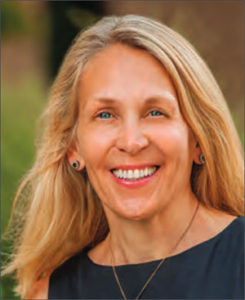This article originally appeared in The Bar Examiner print edition, Winter 2021-2022 (Vol. 90, No. 4), pp. 2–3.By Judith A. Gundersen
 Reflections for 2022
Reflections for 2022
As I reflect on the past year and what lies ahead, I can’t help but feel a sense of optimism and excitement for the bar admissions community in 2022, notwithstanding continuing COVID-19 challenges and broader societal and institutional disruption and division.
Why such optimism when this year is starting off like a rinse and repeat of the last? It’s simple: there are so many talented and dedicated people in the bar admissions community who share core values of excellence, fairness, integrity, and service to courts, the profession, examinees, and the public. These core values, along with our vision of a competent, ethical, and diverse legal profession, not only provide a solid foundation for how we approach and execute our work, but they invite us—even demand us—to be open to new perspectives and new ways of serving our stakeholders in changing times.
We congratulate jurisdictions and candidates for a successful and quiet February 2022 in-person bar exam administration. As I write this column, we are close to releasing MBE scores to jurisdictions, which are themselves in the process of grading the constructed response portions of the exam. We wish all candidates good luck as they await results.
A Series of “Firsts”
These changing times have meant many “firsts” over the past two years: testing safely during a once-in-a-century public health crisis, switching test delivery modes or testing in dual modes, offering the first-ever international MPRE, adapting character and fitness processes both substantively and procedurally to ensure fairness and timeliness, and supporting task forces to revisit the entire admissions process.
All of us at NCBE acknowledge the very hard—and sometimes unrecognized—work undertaken in every US jurisdiction by admissions boards, courts, and staff. We have regular contact with our admissions colleagues all over the country; we know firsthand all that staff and volunteers have done to keep the admissions door open.
True to our core values and our vision, NCBE staff have pivoted repeatedly to offer dual testing modes to meet the needs of the 54 jurisdictions that use NCBE exams—not an easy feat when balancing public protection and health, exam access, equity, logistics, security, and local admissions/administration decisions. From July 2020 through July 2021, over 100,000 people took a bar exam; over 56,000 earned portable UBE scores over this period, with over 40,000 in 2021 alone. Over 7,700 of those earning UBE scores in 2021 have already transferred their UBE scores to another UBE jurisdiction.
Over the five in-person administrations of the exam from July 2020 to July 2021 (which includes the two additional in-person fall administrations in September and October 2020), there have been no known reports of COVID transmission. This is due to the careful, exhaustive planning and coordination with public health authorities undertaken by the administrators in each jurisdiction. NCBE staff, too, have shown their mettle time and time again over the past two years. We recently offered the first-ever international MPRE administration in August 2021, migrated to mostly digital character and fitness processes, and provided pass/fail reports to law schools for accreditation purposes, to name a few services. We are looking for new ways in 2022 to enhance our offerings to jurisdictions, candidates, and law schools.
Continued Educational Events
Over the past two years since the onset of the pandemic, NCBE staff has continued to provide educational opportunities to the bar admissions community by holding multiple virtual events, including our 2020 and 2021 Annual Bar Admissions Conferences. Staff also coordinated a number of webinars aimed at assisting jurisdictions navigate the challenges of administering the bar exam during the pandemic.
In fall 2021, NCBE sponsored the in-person Council of Bar Admission Administrators (CBAA) Fall Meeting, which was held in Boston, with 37 jurisdictions represented. The programming was timely and informative. A highlight was a thoughtful presentation by the CBAA’s Diversity, Equity, and Inclusion Committee, chaired by Shela Shanks, Director for the District of Columbia Committee on Admissions. NCBE’s own longstanding Diversity and Inclusion Committee looks forward to collaborating with this CBAA committee to offer programming that prompts everyone in admissions to redouble our commitment to a diverse profession that better serves the public.
The Next Generation of the Bar Exam
And of course, our biggest project of all is development of the next generation of the bar exam, which is progressing at full speed. As I write this column, we are entering a new phase of this multiyear project—implementation, which includes making content decisions, prototyping new item types, pilot testing, and exploring test delivery options, all made possible by exhaustive and careful planning. See the update on The Next Generation of the Bar Exam article in this issue.
As this goes to press, we have just shared the proposed content scope outline for the eight Foundational Concepts and Principles and the seven Foundational Skills and are very excited to get your input. Many volunteers have been working on this effort—Content Scope Committee members, jurisdiction focus groups, Jurisdiction Advisory Committee members, and more. There will be more opportunities for service and collaboration as we enter new phases of the project. We want and need input from jurisdictions and other stakeholders.
We are cognizant that each jurisdiction must make its own decision about whether to adopt the new bar exam. What we offer to all Courts, boards, and staff is our commitment to providing you and your candidates with the best possible assessment tools to help you fulfill your admissions role. Collectively, we have a once-in-a-generation opportunity to explore ways to serve all stakeholders through innovation while maintaining fidelity to validity, fairness, economy, and public protection.
Here’s to 2022—a new year of opportunities for us all to ensure a competent, ethical, and diverse legal profession.
Until the next issue,

Judith A. Gundersen
Contact us to request a pdf file of the original article as it appeared in the print edition.







